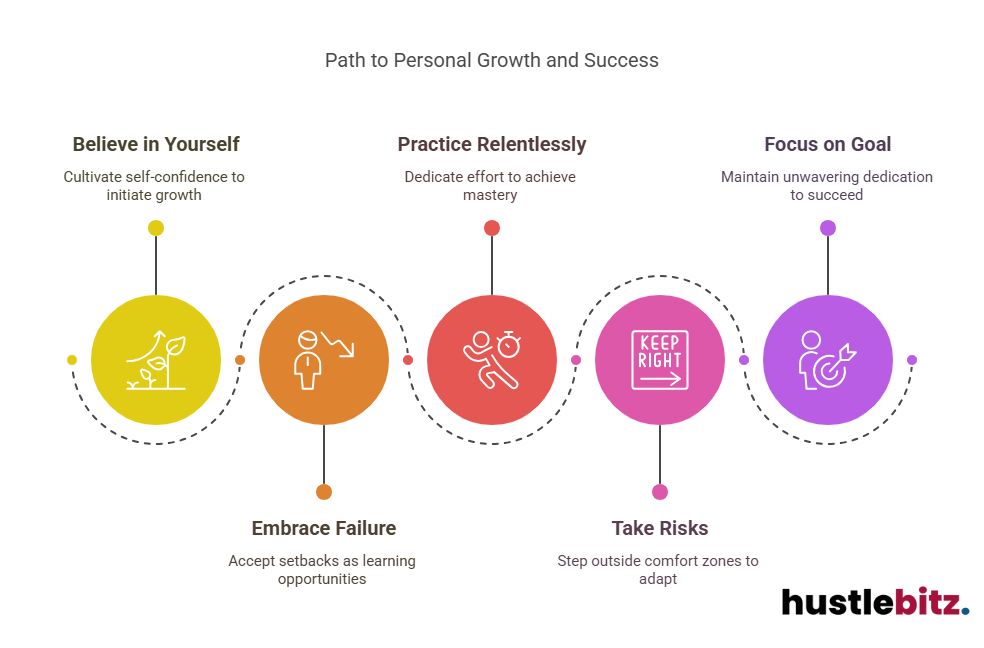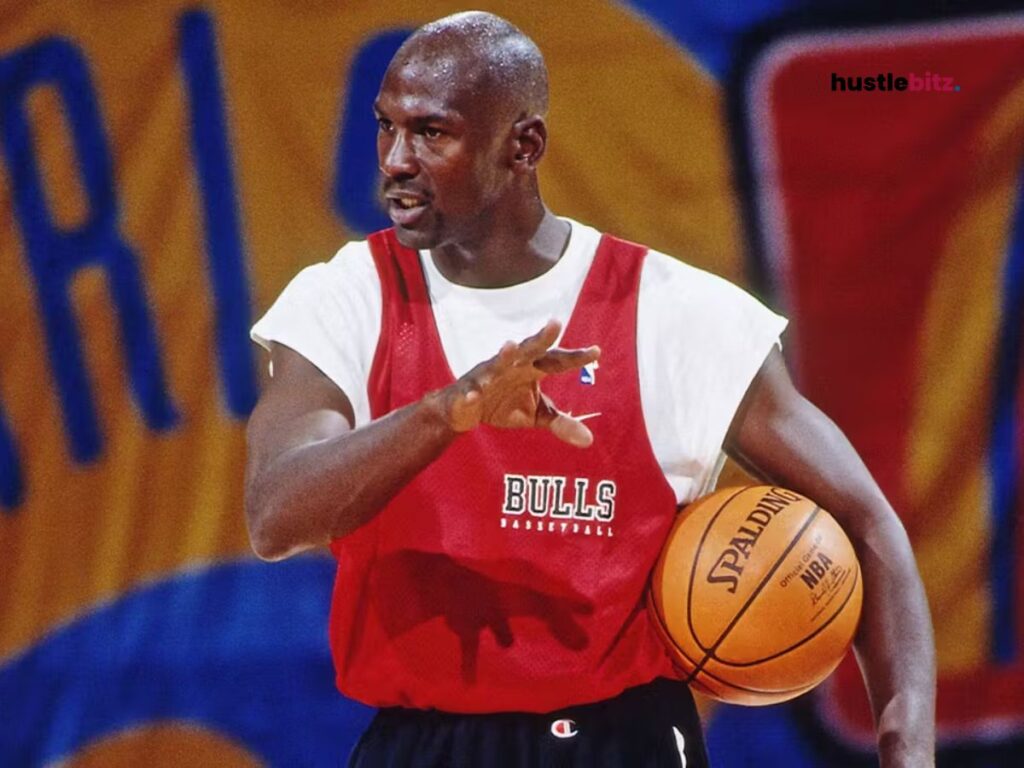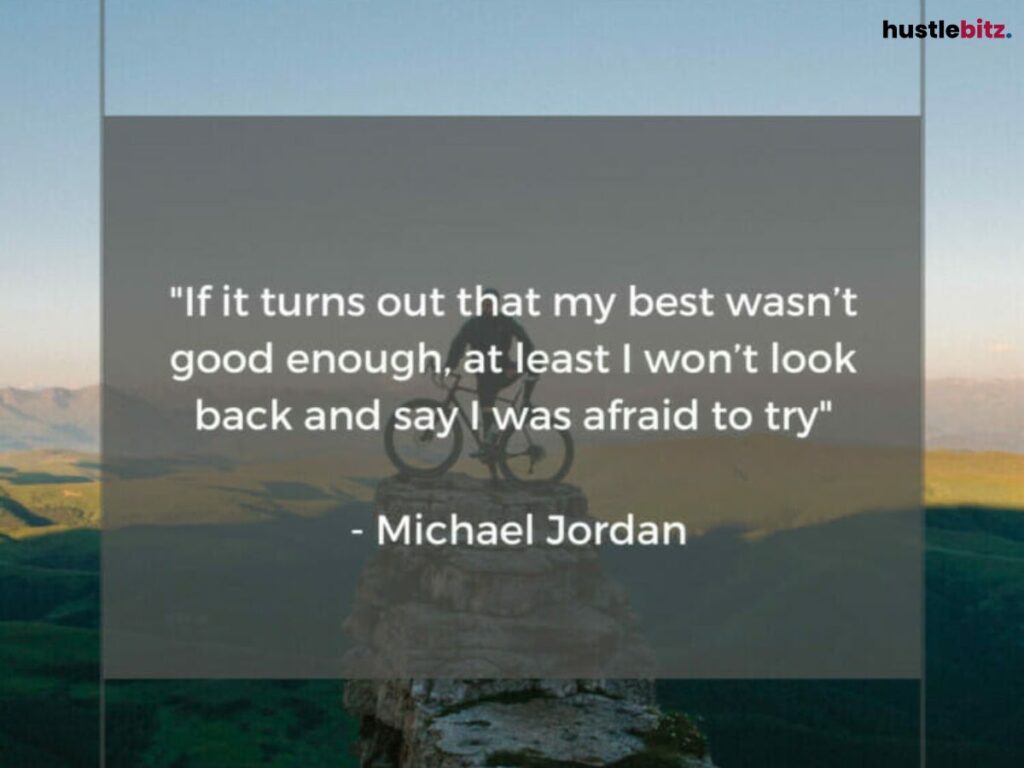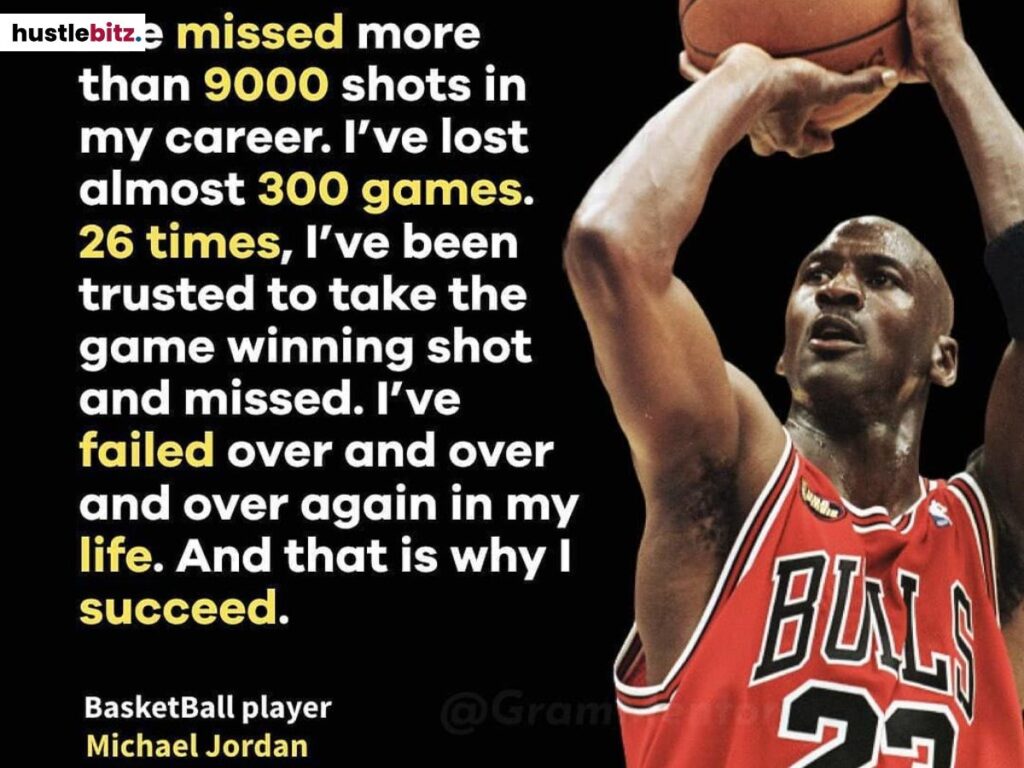Michael Jordan’s journey through basketball and life is a testament to the power of self-belief, resilience, and relentless practice. His words, “You must expect great things of yourself before you can do them,” reflect the importance of self-confidence. He emphasizes embracing failure, as seen in, “Always turn a negative situation into a positive situation.” Jordan’s commitment to practice, mental resilience, and goal-oriented mindset, embodied in his quote, “If you quit once, it becomes a habit. Never quit!” provides a playbook for success. Embodying these philosophies can transform one’s approach to challenges and personal growth, revealing deeper insights into mastery and excellence.
Key Takeaways
- Believe in yourself to foster personal growth and resilience.
- Embrace failure as a natural part of the journey toward success.
- Practice relentlessly to achieve mastery and excellence.
- Take risks to push beyond comfort zones and enhance adaptability.
- Focus on the goal with unwavering dedication to overcome self-doubt.

Believe in Yourself

“You must expect great things of yourself before you can do them.”
Believing in oneself is a fundamental principle for achieving success, as encapsulated by Michael Jordan’s assertion: “You must expect great things of yourself before you can do them.” This quote underscores the importance of self-confidence and the pivotal role it plays in realizing one’s potential.
For those who aspire to lead a life defined by freedom and achievement, self-confidence building becomes an essential endeavor. It is the bedrock upon which dreams are constructed and goals are attained.
A positive mindset is crucial in nurturing this self-belief. By focusing on one’s strengths and maintaining an optimistic outlook, individuals can foster an environment conducive to personal growth. This mindset acts as a catalyst, propelling one forward even in the face of adversity.
Personal growth, in turn, is a journey marked by continuous improvement and the courage to step out of one’s comfort zone.
Overcoming obstacles is an inevitable part of this journey. Challenges, rather than being deterrents, should be viewed as opportunities to strengthen one’s resolve and inner strength. The process of confronting and surmounting these obstacles reinforces one’s belief in their capabilities and fortifies their determination.
Inner strength, cultivated through self-confidence and a positive mindset, enables individuals to navigate the complexities of life with resilience and grace. It is this inner fortitude that empowers one to expect great things of themselves and strive towards achieving them.
Embrace Failure
“Always turn a negative situation into a positive situation.”
Turning a negative situation into a positive one is a philosophy that Michael Jordan passionately advocates. His words, “Always turn a negative situation into a positive situation,” resonate deeply with individuals who seek to break free from the constraints of setbacks.
Embracing a failure mindset is not about accepting defeat but rather recognizing that failure is an essential part of the journey toward success. It provides a fertile ground for positive transformation and resilience building.
Jordan’s career is a testament to the power of overcoming obstacles. Despite being cut from his high school basketball team, he didn’t succumb to despair. Instead, he saw this setback as a growth opportunity, fueling his determination to improve.
This mindset allowed him to confront challenges head-on, transforming each failure into a stepping stone toward achieving greatness.
In a world that often views failure as a final verdict, adopting Jordan’s perspective can be liberating. It encourages individuals to reframe their understanding of setbacks, viewing them not as insurmountable barriers but as catalysts for personal and professional growth.
Resilience building becomes a natural byproduct of this approach. When one learns to navigate through adversity, each obstacle surmounted adds to a reservoir of inner strength and perseverance.
For those yearning for freedom from the fear of failure, Jordan’s philosophy offers profound insight. By embracing failure and committing to positive transformation, individuals can unlock their potential and chart a path toward continual improvement.
It’s a reminder that every negative situation holds within it the seeds of a positive outcome, waiting to be nurtured through resilience and growth.
Practice Relentlessly

“I play to win, whether during practice or a real game. And I will not let anything get in the way of me and my competitive enthusiasm to win.”
The concept of transforming setbacks into opportunities seamlessly aligns with Michael Jordan’s relentless dedication to practice. His well-documented statement, “I play to win, whether during practice or a real game. And I will not let anything get in the way of me and my competitive enthusiasm to win,” encapsulates the essence of his competitive spirit. This mindset not only propelled him to extraordinary heights but also serves as a timeless lesson for anyone striving for greatness.
Michael Jordan’s practice habits were the cornerstone of his success, rooted in a winning mindset that left no room for complacency. His relentless pursuit of excellence meant that every training session was treated with the same intensity as a championship game. This unwavering dedication is a powerful reminder that the path to mastery is paved with consistent, focused effort.
For those yearning for freedom from mediocrity, adopting Jordan’s approach to training intensity can be transformative. It encourages an unwavering commitment to personal growth and excellence, regardless of the setting. By embracing a competitive spirit in all endeavors, individuals can elevate their performance and break through self-imposed limitations.
Moreover, Jordan’s philosophy underscores the importance of resilience. In the face of obstacles, his commitment to practice became an avenue for overcoming challenges and honing skills. This relentless pursuit of improvement is not just about physical prowess but also about cultivating a mindset that thrives on perseverance and passion.
Take Risks

“I know fear is an obstacle for some people, but it is an illusion to me. Failure always made me try harder next time.”
Confronting fear head-on, Michael Jordan‘s perspective on risk-taking is encapsulated in his declaration, “I know fear is an obstacle for some people, but it is an illusion to me.” This mindset reveals a profound understanding of fear management and its role in achieving success. For Jordan, fear is not a barrier but a fleeting mirage that can be overcome through resilience and determination.
Effective risk assessment is crucial in any field, and Jordan exemplifies this by embracing the potential for failure as a stepping stone to personal growth. His approach underscores the importance of viewing setbacks not as end points but as opportunities for learning and improvement. This strategy not only mitigates the paralyzing effects of fear but also enhances one’s capacity for overcoming obstacles.
By reframing failure as a catalyst for trying harder, Jordan transforms it into a powerful motivator. Personal growth is inherently tied to the ability to take calculated risks and confront fears. Jordan’s career is a testament to the idea that true success is often the result of daring to push beyond comfort zones.
This philosophy encourages individuals to adopt resilience strategies that foster perseverance and adaptability. Whether on the basketball court or in life’s various arenas, the willingness to face fear and potential failure head-on is a defining trait of those who achieve greatness.
In essence, Jordan’s insights into fear management and risk assessment provide a blueprint for transcending limitations. His legacy serves as a reminder that the path to success is paved with the courage to take risks, the wisdom to learn from failures, and the resilience to keep striving for excellence.
Focus on the Goal
“If you quit once, it becomes a habit. Never quit!”
Building on the theme of overcoming fear and embracing failure as a growth opportunity, an unwavering focus on one’s goals is another cornerstone of Michael Jordan’s success philosophy. The quote, “If you quit once, it becomes a habit. Never quit!” underscores the importance of persistence and dedication to achieving one’s aspirations. This mindset is essential for those who desire freedom, as it empowers individuals to break free from the shackles of self-doubt and inertia.
Goal setting is the first step toward achieving any significant milestone. It provides a clear target and a roadmap to follow. However, merely setting goals is not enough; it requires a robust set of perseverance strategies to stay the course. Jordan’s emphasis on never quitting highlights the necessity of mental resilience.
Facing obstacles is inevitable, but how one responds to these challenges can determine the outcome. By viewing setbacks as temporary and surmountable, individuals can remain focused on their ultimate objectives.
Motivation techniques are vital in maintaining this focus. Engaging in positive self-talk, visualizing success, and celebrating small victories can keep the drive alive. These methods help in overcoming obstacles by reinforcing a positive mindset and fostering an environment where quitting is not an option.
The key takeaway from Jordan’s quote is that quitting can become a detrimental habit, eroding one’s determination and undermining long-term success. By cultivating mental resilience and leveraging effective goal setting and perseverance strategies, one can navigate the path to success with unwavering focus and determination.
This relentless pursuit of goals not only leads to personal achievements but also embodies the essence of true freedom.
Learn From Defeats

“If it turns out that my best wasn’t good enough, at least I won’t look back and say I was afraid to try.”
Michael Jordan’s profound wisdom encapsulated in the quote, “If it turns out that my best wasn’t good enough, at least I won’t look back and say I was afraid to try,” serves as a powerful reminder of the value of effort over outcome. This sentiment resonates deeply with those who seek freedom in their pursuits, emphasizing that the courage to try is more valuable than the fear of failure.
In the realm of resilience in sports, Jordan’s words highlight the importance of pushing through adversity. Athletes often face intense pressure and the possibility of defeat. However, it is the willingness to confront these challenges head-on that fosters mental toughness.
The key lesson here is that experiencing failure is not a reflection of one’s worth or abilities but a stepping stone toward personal growth. Overcoming fear is central to adopting a learning mindset. When fear of failure is removed, individuals can focus on the process rather than the outcome.
This perspective shift allows for continuous improvement and the development of critical skills. By valuing effort and persistence, athletes and professionals alike can build a resilient character that thrives under pressure.
The essence of personal growth lies in the willingness to embrace challenges and learn from defeats. Jordan’s quote underscores that it is not the scoreboard that defines success, but the relentless pursuit of excellence.
This mindset empowers individuals to take risks and learn from their experiences, fostering a cycle of improvement and resilience. Ultimately, Michael Jordan’s insight provides a motivational framework for anyone striving to achieve greatness.
It encourages a focus on effort, the courage to take risks, and the resilience to learn from setbacks, thereby promoting a fulfilling and liberated approach to personal and professional endeavors.
Push Your Limits

“I’ve missed more than 9000 shots in my career. I’ve lost almost 300 games. 26 times, I’ve been trusted to take the game winning shot and missed. I’ve failed over and over and over again in my life. And that is why I succeed.”
In reflecting on his storied career, Michael Jordan’s acknowledgment of his numerous failures—missing over 9000 shots, losing nearly 300 games, and failing to make the game-winning shot 26 times—illuminates a fundamental truth about success. This unvarnished look at his setbacks underscores the essence of overcoming obstacles and resilience training. Failure, in Jordan’s perspective, is not a roadblock but a stepping stone towards greatness.
Jordan’s words challenge us to adopt a failure mindset, which views setbacks as opportunities for growth rather than reasons for despair. This mindset is crucial for developing mental toughness, essential for pushing boundaries and achieving personal freedom. When we embrace our failures, we not only learn from them but also build the resilience needed to persevere.
| Aspect | Michael Jordan’s Experience |
| Missed Shots | Over 9000 |
| Lost Games | Nearly 300 |
| Missed Game-Winners | 26 |
| Key Takeaway | Success through repeated failure and resilience |
Understanding that even the greatest athletes experience failure on a grand scale provides a liberating perspective. It reassures us that setbacks are a natural part of the journey toward success. The key lies in how we respond to these challenges—whether we let them define us or use them as fuel to push our limits further.
In the end, Jordan’s narrative isn’t just about basketball; it’s a universal lesson in persistence. By pushing boundaries and embracing a failure mindset, we cultivate the mental toughness required to overcome obstacles. This resilience not only drives us toward our goals but also grants us the freedom to pursue our passions without fear.
Final Thoughts
Michael Jordan’s words provide more than just inspiration; they offer actionable strategies for personal growth and resilience. His focus on self-belief, relentless practice, risk-taking, and embracing failure underscores the importance of mental toughness and perseverance. Jordan’s journey teaches us that success isn’t about avoiding failure but about learning from it, pushing past limits, and staying committed to growth. By adopting these principles, we can face challenges with confidence and transform setbacks into opportunities for improvement. In essence, his legacy is a guide for anyone striving for excellence, reminding us that mastery is achieved through resilience, dedication, and a refusal to quit.




